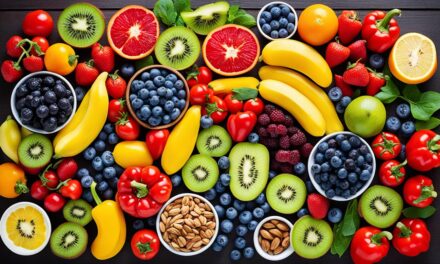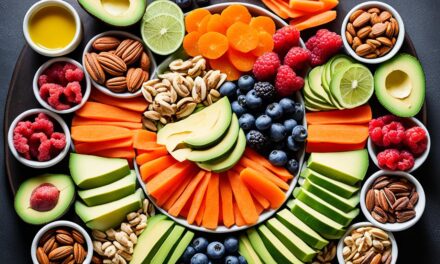Did you know that billions of dollars are wasted on vitamin supplements every year? Despite their popularity, the effectiveness of these supplements in providing essential nutrients and improving health is often questionable. So how do you know if your vitamin supplement is worth the money? Let’s delve deeper into the evidence behind vitamin effectiveness and absorption rates to determine if these health supplements are truly beneficial.
Key Takeaways:
- Billions of dollars are wasted on vitamin supplements each year.
- The effectiveness of vitamin supplements in providing essential nutrients remains questionable.
- Evidence-based practices, such as a healthy diet and exercise, are more important for overall health.
- Individual considerations, such as pregnancy or nutrient deficiencies, should be taken into account.
- Consult with healthcare providers for personalized advice on vitamin and supplement use.
The Illusion of Multivitamins and Dietary Supplements
Are you among the many people who rely on multivitamins and dietary supplements to bridge the nutritional gaps in your diet? Well, it’s time to snap out of the illusion. According to the experts at Northwestern Medicine, these supplements are nothing but a waste of your hard-earned money, especially if you are already leading a healthy life. Instead of investing in expensive pills, it’s time to focus on evidence-based practices that truly promote your overall health.
It’s easy to fall for the marketing tactics and promises of multivitamins and dietary supplements that claim to provide all the essential nutrients your body needs. However, the reality is quite different. These supplements often fail to deliver the same benefits as a balanced diet and regular exercise. In fact, research suggests that relying solely on supplements might be counterproductive and can lead to more harm than good.
“Don’t be fooled by the allure of quick fixes. Your body needs a holistic approach to nutrition.”
Instead of popping pills, focus on adopting evidence-based practices that are proven to contribute to your overall health and well-being. Eating a balanced diet that includes a variety of nutrient-rich foods and engaging in regular exercise are the keys to achieving optimal health. By nourishing your body with real, whole foods, you provide it with a wide range of vitamins, minerals, and other essential nutrients it needs to function properly.
The Power of a Balanced Diet
A truly balanced diet is like a symphony of flavors and nutrients. It includes fruits, vegetables, whole grains, lean proteins, and healthy fats, all working together to provide your body with the essential building blocks for optimal health. These natural sources of nutrients offer greater bioavailability, meaning your body can absorb and utilize them more effectively compared to synthetic supplements.
When you consume whole foods, you benefit from a synergy of vitamins, minerals, phytochemicals, and fiber that work in harmony to deliver countless health benefits. Your body thrives on this symphony of nutrients, and it’s important not to disrupt this delicate balance with isolated nutrients from supplements.
“Say goodbye to the illusion of multivitamins and dietary supplements and hello to the power of a balanced diet.”
By choosing to focus on a balanced diet, you not only nourish your body but also reduce the risk of chronic diseases, boost your immune system, and improve your overall well-being. It’s a win-win situation that no pill can replicate.
Exercise: The Missing Piece of the Puzzle
While a balanced diet sets the foundation for a healthy life, regular exercise adds the missing piece of the puzzle. Physical activity not only helps you maintain a healthy weight but also improves your cardiovascular health, bone density, muscle strength, and mental well-being.
By incorporating exercise into your daily routine, you enhance your body’s ability to absorb and utilize nutrients from the foods you eat. It’s like giving your body the key to unlocking the full potential of the nutrients provided by a balanced diet.
So, rather than relying on a pill to bridge your nutritional gaps, go for a walk, take a yoga class, or engage in any form of exercise that you enjoy. Your body will thank you for it.
Remember, when it comes to your health, there are no shortcuts or quick fixes. Don’t fall for the illusion of multivitamins and dietary supplements. Instead, prioritize a balanced diet and regular exercise as the foundation of your well-being. Your body deserves nothing less than the best, and that starts with nourishing it with the power of real, whole foods.
The Lack of Evidence for Vitamin Benefits
Despite the widespread belief that vitamins and supplements are essential for optimal health, evidence-based recommendations paint a different picture. A systematic review of 84 studies conducted by the United States Preventive Services Task Force reveals a lack of convincing evidence to support the effectiveness of multivitamins or single supplements in preventing cardiovascular disease and cancer.
So, what does this mean for you? It’s time to take a closer look at the claims surrounding vitamins and understand the limitations of their benefits. While some individuals may have vitamin deficiencies that require targeted supplementation, the general population may not reap the same health advantages.
The Risky Business of Beta-Carotene
The United States Preventive Services Task Force explicitly advises against taking beta-carotene supplements. Why? Well, it turns out that these supplements come with an increased risk of lung cancer. Before shelling out your hard-earned money on this vitamin, consider the potential negative consequences to your health.
The Vitamin E Enigma
Another vitamin that fails to deliver on its promises is vitamin E. The task force also advises against taking vitamin E supplements due to the lack of net benefit in reducing mortality or disease. Save your money for something more worthwhile than a questionable supplement.
Focus on Cardiovascular Counseling
“There’s a wealth of evidence supporting the role of lifestyle modifications in reducing cardiovascular risks. Counseling individuals about exercise, smoking cessation, and maintaining a healthy weight can make a significant difference in their long-term heart health.”
Experts agree that instead of relying on vitamins and supplements, shifting the focus to comprehensive counseling about reducing cardiovascular risks is a wiser approach. By addressing modifiable risk factors through lifestyle changes, such as exercise, smoking cessation, and maintaining a healthy weight, you can significantly improve your cardiovascular health and overall well-being.
So, before you reach for that bottle of vitamins, consider the lack of solid evidence supporting their benefits. Taking a cautious and informed approach to your health will help you navigate through the sea of misinformation and make choices that truly matter.
The Appeal of Vitamin Supplements
Are you one of the many adults in the US who rely on dietary supplements to bridge the nutritional gaps in your diet? You’re not alone! In fact, over half of US adults take dietary supplements, hoping to extract the vitamins and minerals found in fruits and vegetables and package them into a convenient pill.
But here’s the thing:
“Whole fruits and vegetables contain a mixture of vitamins, phytochemicals, fiber, and other nutrients that work synergistically to deliver health benefits,”
explains the team of Northwestern Medicine scientists. They highlight that these micronutrients in isolation may not act the same way in the body. So, while dietary supplements can help individuals with specific vitamin deficiencies, they may not offer the same comprehensive health benefits as whole foods.
The Power of Whole Foods
When you consume a balanced diet consisting of nutrient-packed foods, like fruits, vegetables, whole grains, and low-fat dairy products, you’re not just getting a dose of vitamins and minerals. You’re also benefiting from phytochemicals, fiber, and other essential nutrients that are naturally present in these foods.
- Phytochemicals are biologically active compounds found in plants that provide numerous health benefits, such as reducing the risk of chronic diseases like heart disease and cancer.
- Fiber helps regulate digestion, promotes healthy cholesterol levels, and aids in weight management.
So, while dietary supplements may provide some isolated vitamins and minerals, they lack the complete nutritional package found in whole foods.
The Importance of a Balanced Diet
Instead of relying solely on dietary supplements, experts recommend focusing on maintaining a balanced diet that includes a variety of nutrient-rich foods. By incorporating a colorful array of fruits, vegetables, whole grains, and low-fat dairy products into your meals, you’ll be providing your body with the necessary vitamins, minerals, and other beneficial compounds it needs to thrive.
“Investing in nutrient-packed foods is a wiser choice than spending billions of dollars on vitamin and mineral supplements,”
advises the team of nutrition experts from Johns Hopkins.
Takeaways
- Dietary supplements can be beneficial for individuals with specific vitamin deficiencies.
- However, whole foods provide a complete nutritional package that includes vitamins, minerals, phytochemicals, fiber, and other essential nutrients.
- A balanced diet that incorporates a variety of nutrient-packed foods is the best way to obtain these essential nutrients and support overall health and well-being.
The Need for Individual Considerations
When it comes to the use of dietary supplements, a personalized approach is crucial, especially for pregnant individuals. While the new guidelines from the United States Preventive Services Task Force may not apply to everyone, there are specific considerations that need to be taken into account for pregnant women.
Prenatal vitamins, which typically include folic acid, are essential for supporting healthy fetal development. Folic acid plays a vital role in preventing neural tube defects, such as spina bifida, in the early stages of pregnancy. Therefore, it is recommended for all pregnant women to ensure they are taking the necessary prenatal vitamins containing folic acid.
However, recent research has shed light on another important aspect that pregnant women should prioritize: cardiovascular health. Studies have indicated that a majority of women in the U.S. have poor cardiovascular health even before becoming pregnant. This poses significant risks not only for the mother but also for the developing baby.
Optimizing cardiovascular health prior to pregnancy is crucial, and this involves more than just taking prenatal vitamins. A well-rounded approach that includes regular exercise, maintaining a healthy weight, and managing pre-existing conditions like high blood pressure or diabetes is essential.
It’s important to understand that everyone’s nutritional needs and health circumstances are unique. Consulting with a healthcare professional can help ensure that pregnant individuals receive the necessary guidance and recommendations tailored to their specific situation. This personalized approach will take into account factors such as existing health conditions, dietary requirements, and the need for specific dietary supplements beyond prenatal vitamins.
To summarize, while prenatal vitamins and folic acid are vital for pregnant individuals, a comprehensive approach that considers cardiovascular health and personalized recommendations is crucial for the well-being of both the mother and the baby.
The Alternative to Supplements – A Healthy Diet
If you’re looking for a cost-effective way to improve your health, consider investing your hard-earned dollars in nutrient-packed foods instead of vitamin and mineral supplements. According to nutrition experts at Johns Hopkins, fruits, vegetables, whole grains, and low-fat dairy products are the key to a healthy diet.
These foods are not just rich in vitamins and minerals, but also contain other beneficial components such as phytochemicals and fiber. They work together synergistically to promote optimal health and well-being. By incorporating these nutrient-packed foods into your daily meals, you can ensure a balanced intake of essential nutrients.
One crucial aspect of a healthy diet is avoiding excessive intake of saturated fats, which are commonly found in processed foods and fatty cuts of meat. Instead, focus on lean sources of protein and plant-based alternatives. This will help reduce the risk of cardiovascular diseases and maintain a healthy weight.
The Power of Fruits and Vegetables
When it comes to fruits and vegetables, variety is key. Different colored produce indicates the presence of various antioxidants, vitamins, and minerals. By consuming a rainbow of fruits and vegetables, you can ensure a diverse range of nutrients that promote overall health.
In addition to their nutrient content, fruits and vegetables are also high in fiber, which aids in digestion and helps maintain bowel regularity. They are naturally low in calories and high in water content, making them excellent choices for weight management and overall health.
Whole Grains and Low-Fat Dairy Products
When selecting grains, opt for whole grains over refined grains. Whole grains contain the entire grain kernel, including the bran, germ, and endosperm, which provide an abundance of vitamins, minerals, fiber, and antioxidants.
Low-fat dairy products, such as milk, yogurt, and cheese, are excellent sources of calcium, protein, and other essential nutrients. They provide the necessary building blocks for healthy bones and teeth, as well as overall growth and development.
Omega-3 Fatty Acids for Heart Health
Omega-3 fatty acids, found in fatty fish like salmon, mackerel, and sardines, are essential for cardiovascular health. These healthy fats have been shown to reduce inflammation, lower blood pressure, and improve overall heart function. If you follow a vegetarian or vegan diet, you can obtain omega-3 fatty acids from plant-based sources like flaxseeds, chia seeds, and walnuts.
Remember, a healthy diet is not a temporary fix but a long-term lifestyle choice. By prioritizing nutrient-packed foods like fruits, vegetables, whole grains, and low-fat dairy products, you can nourish your body with the vitamins, minerals, and other beneficial substances it needs to thrive.
So, before reaching for that bottle of supplements, consider alternatives that provide a wide array of nutrients naturally. By making these dietary changes, you’ll not only save money but also enjoy the numerous health benefits that come with a balanced, healthy diet.
Conclusion
In the quest for optimal health, the widespread use of vitamin supplements has become a controversial topic. While their effectiveness in preventing cardiovascular disease and cancer remains questionable, one thing is clear: evidence-based practices such as following a healthy diet and engaging in regular exercise play a vital role in promoting overall well-being.
Instead of relying solely on vitamin supplements, it is important to prioritize nutrient-packed foods in your diet. Fruits, vegetables, whole grains, and low-fat dairy products offer a plethora of vitamins, minerals, and other essential nutrients that work synergistically to support your health.
However, it is crucial to adopt a personalized approach, taking into consideration individual circumstances such as pregnancy or nutrient deficiencies. Seeking advice from healthcare providers before starting any supplement regime ensures proper guidance tailored to your unique needs.
Remember, a healthy diet supplemented with evidence-based practices is the key to achieving optimal health. So, embrace the power of nutrient-packed foods and personalized healthcare recommendations for a vibrant and thriving life.
FAQ
Are vitamin supplements a waste of money?
Do multivitamins and dietary supplements fill nutritional gaps?
Is there evidence to support the effectiveness of vitamin supplements in preventing cardiovascular disease and cancer?
Should I take vitamin supplements if I have a vitamin deficiency?
Should pregnant individuals take vitamin supplements?
Are nutrient-packed foods a better alternative to vitamin supplements?
What is the key to obtaining necessary nutrients for overall well-being?
MORE SOURCES TO READ:
- https://www.hopkinsmedicine.org/health/wellness-and-prevention/is-there-really-any-benefit-to-multivitamins
- https://www.verywellhealth.com/vitamin-mineral-supplements-waste-money-5496909
- https://news.northwestern.edu/stories/2022/06/vitamins-supplements-are-a-waste-of-money-for-most-americans/
![]()














Recent Comments